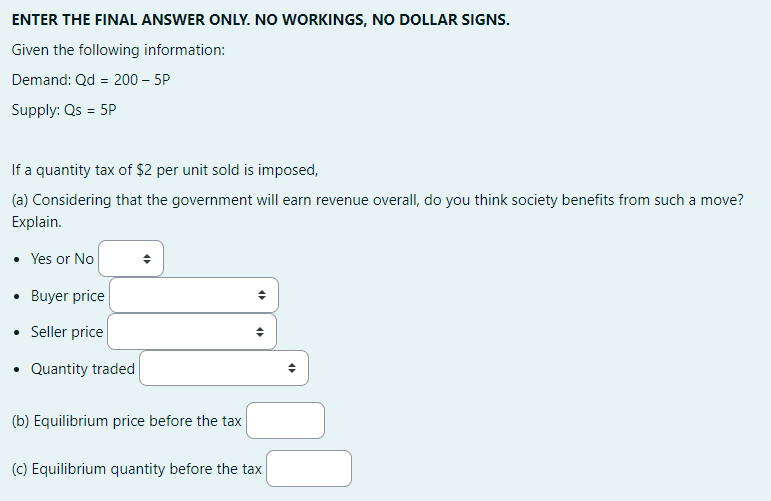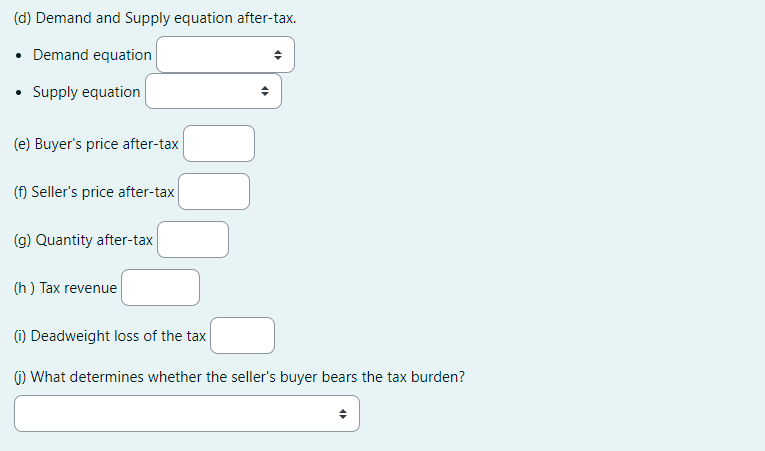Given the following information: Demand: Qd = 200-5P Supply: Qs = 5P If a quantity tax of $2 per unit sold is imposed, (a) Considering that the government will earn revenue overall, do you think society benefits from such a move? Explain. • Yes or No • Buyer price • Seller price • Quantity traded ♦ (b) Equilibrium price before the tax 4) ( (c) Equilibrium quantity before the tax 4
Given the following information: Demand: Qd = 200-5P Supply: Qs = 5P If a quantity tax of $2 per unit sold is imposed, (a) Considering that the government will earn revenue overall, do you think society benefits from such a move? Explain. • Yes or No • Buyer price • Seller price • Quantity traded ♦ (b) Equilibrium price before the tax 4) ( (c) Equilibrium quantity before the tax 4
Macroeconomics: Private and Public Choice (MindTap Course List)
16th Edition
ISBN:9781305506756
Author:James D. Gwartney, Richard L. Stroup, Russell S. Sobel, David A. Macpherson
Publisher:James D. Gwartney, Richard L. Stroup, Russell S. Sobel, David A. Macpherson
Chapter4: Demand And Demand: Applications And Extensions
Section: Chapter Questions
Problem 13CQ
Related questions
Question
Please answer questions (a), (b) and (c) if possible. Thank you.

Transcribed Image Text:ENTER THE FINAL ANSWER ONLY. NO WORKINGS, NO DOLLAR SIGNS.
Given the following information:
Demand: Qd = 200 - 5P
Supply: Qs = 5P
If a quantity tax of $2 per unit sold is imposed,
(a) Considering that the government will earn revenue overall, do you think society benefits from such a move?
Explain.
• Yes or No
• Buyer price
Seller price
Quantity traded
(b) Equilibrium price before the tax
4
(c) Equilibrium quantity before the tax

Transcribed Image Text:(d) Demand and Supply equation after-tax.
• Demand equation
Supply equation
(e) Buyer's price after-tax
(f) Seller's price after-tax
(g) Quantity after-tax
(h) Tax revenue
(i) Deadweight loss of the tax
45
(1) What determines whether the seller's buyer bears the tax burden?
Expert Solution
This question has been solved!
Explore an expertly crafted, step-by-step solution for a thorough understanding of key concepts.
Step by step
Solved in 5 steps with 11 images

Knowledge Booster
Learn more about
Need a deep-dive on the concept behind this application? Look no further. Learn more about this topic, economics and related others by exploring similar questions and additional content below.Recommended textbooks for you

Macroeconomics: Private and Public Choice (MindTa…
Economics
ISBN:
9781305506756
Author:
James D. Gwartney, Richard L. Stroup, Russell S. Sobel, David A. Macpherson
Publisher:
Cengage Learning

Economics: Private and Public Choice (MindTap Cou…
Economics
ISBN:
9781305506725
Author:
James D. Gwartney, Richard L. Stroup, Russell S. Sobel, David A. Macpherson
Publisher:
Cengage Learning

Microeconomics: Private and Public Choice (MindTa…
Economics
ISBN:
9781305506893
Author:
James D. Gwartney, Richard L. Stroup, Russell S. Sobel, David A. Macpherson
Publisher:
Cengage Learning

Macroeconomics: Private and Public Choice (MindTa…
Economics
ISBN:
9781305506756
Author:
James D. Gwartney, Richard L. Stroup, Russell S. Sobel, David A. Macpherson
Publisher:
Cengage Learning

Economics: Private and Public Choice (MindTap Cou…
Economics
ISBN:
9781305506725
Author:
James D. Gwartney, Richard L. Stroup, Russell S. Sobel, David A. Macpherson
Publisher:
Cengage Learning

Microeconomics: Private and Public Choice (MindTa…
Economics
ISBN:
9781305506893
Author:
James D. Gwartney, Richard L. Stroup, Russell S. Sobel, David A. Macpherson
Publisher:
Cengage Learning

Microeconomics: Principles & Policy
Economics
ISBN:
9781337794992
Author:
William J. Baumol, Alan S. Blinder, John L. Solow
Publisher:
Cengage Learning

